2021年高中英语Unit3FamilymattersPeriod3听说课教案外研版必修一
- 格式:doc
- 大小:165.50 KB
- 文档页数:4
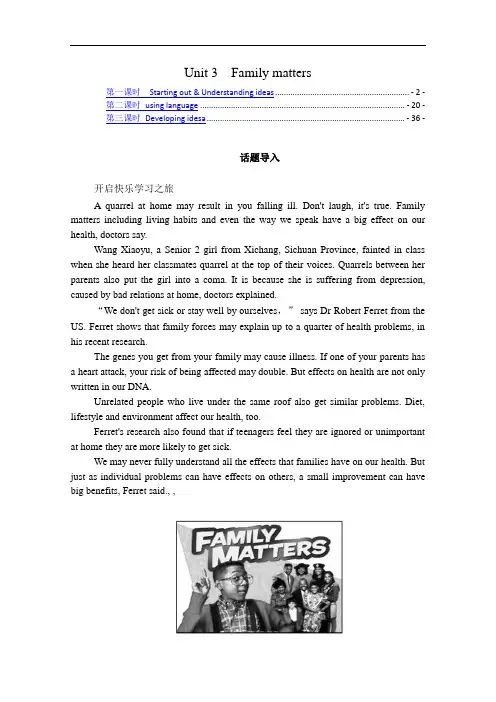
Unit 3 Family matters第一课时Starting out & Understanding ideas ............................................................. - 2 -第二课时using language ............................................................................................. - 20 -第三课时Developing idesa .......................................................................................... - 36 -话题导入开启快乐学习之旅A quarrel at home may result in you falling ill. Don't laugh, it's true. Family matters including living habits and even the way we speak have a big effect on our health, doctors say.Wang Xiaoyu, a Senior 2 girl from Xichang, Sichuan Province, fainted in class when she heard her classmates quarrel at the top of their voices. Quarrels between her parents also put the girl into a coma. It is because she is suffering from depression, caused by bad relations at home, doctors explained.“We don't get sick or stay well by ourselves,” says Dr Robert Ferret from the US. Ferret shows that family forces may explain up to a quarter of health problems, in his recent research.The genes you get from your family may cause illness. If one of your parents has a heart attack, your risk of being affected may double. But effects on health are not only written in our DNA.Unrelated people who live under the same roof also get similar problems. Diet, lifestyle and environment affect our health, too.Ferret's research also found that if teenagers feel they are ignored or unimportant at home they are more likely to get sick.We may never fully understand all the effects that families have on our health. But just as individual problems can have effects on others, a small improvement can have big benefits, Ferret said., ,家人对我们来说非常重要。
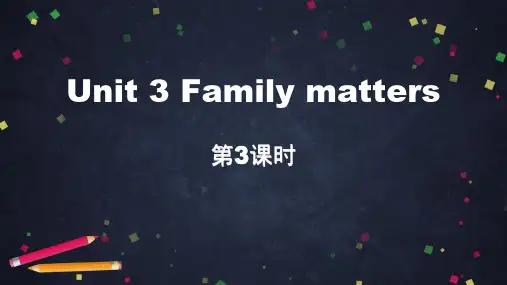
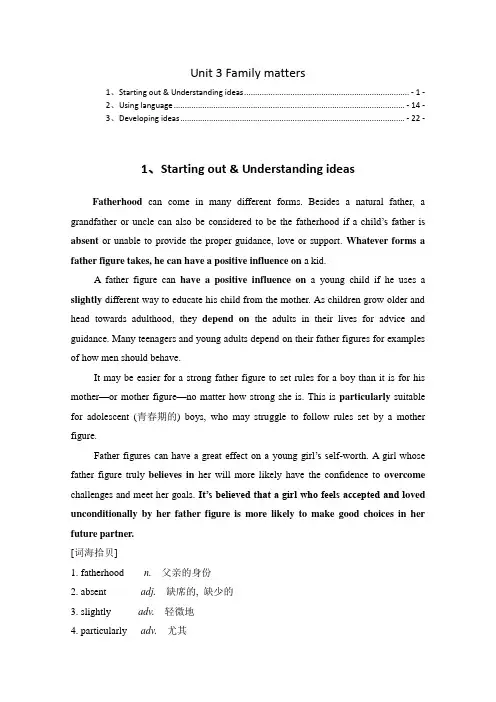
Unit 3 Family matters1、Starting out & Understanding ideas ........................................................................... - 1 -2、Using language ......................................................................................................... - 14 -3、Developing ideas ...................................................................................................... - 22 -1、Starting out & Understanding ideasFatherhood can come in many different forms. Besides a natural father, a grandfather or uncle can also be considered to be the fatherhood if a ch ild’s father is absent or unable to provide the proper guidance, love or support. Whatever forms a father figure takes, he can have a positive influence on a kid.A father figure can have a positive influence on a young child if he uses a slightly different way to educate his child from the mother. As children grow older and head towards adulthood, they depend on the adults in their lives for advice and guidance. Many teenagers and young adults depend on their father figures for examples of how men should behave.It may be easier for a strong father figure to set rules for a boy than it is for his mother—or mother figure—no matter how strong she is. This is particularly suitable for adolescent (青春期的) boys, who may struggle to follow rules set by a mother figure.Father figures can have a great effect on a young girl’s self-worth. A girl whose father figure truly believes in her will more likely have the confidence to overcome challenges and meet her goals. It’s believed that a girl who feels accepted and l oved unconditionally by her father figure is more likely to make good choices in her future partner.[词海拾贝]1. fatherhood n. 父亲的身份2. absent adj. 缺席的, 缺少的3. slightly adv. 轻微地4. particularly adv. 尤其5. overcome vt. 克服[我学我思]1. have a positive influence on对……有积极的影响2. depend on依靠3. believe in信任4. What’s the author’s attitude towa rds father figures?Positive.5. The author writes this text mainly to show the importance of father figures.Ⅰ. 必备单词: 根据提示填写单词1. three main characters三个主要人物2. see the train approaching看到火车靠近3. have a brief chat做简短的交谈4. focus on three main problems 集中于三个主要问题5. future career as a lawyer未来的职业是律师6. respect the old 尊重老人7. work in a studio not a court在录音室而不是法庭工作8. ignore his words 忽略他的话9. have two options for your future你的将来有两种选择10. pass down from generation to generation 代代相传11. the gap between rich and poor 贫富差距12. assume that it is true假设它是正确的→make an assumption (n. )做一个假设13. a professional soccer player一名职业足球运动员→a doctor by profession (n. ) 职业是医生14. suit your talents适合你的才能→a suitable (adj. ) candidate合适的候选人→a talented (adj. ) violinist 一位有才能的小提琴手Ⅱ. 必备短语: 英汉双译1. turn to. . . for. . . 向(某人)求助; 求助于2. focus on关注; 聚焦于3. raise one’s voice提高嗓门4. calm down (使)平静下来; (使)镇定下来5. be proud of以……为豪6. as well as 和; 又; 既……又……7. play chess 下国际象棋8. take one’s advice 采纳某人的意见9. jump in with both feet 全心全意地从事; 不假思索地匆匆投入10. at the same time 同时Ⅲ. 必备句式: 翻译课文原句, 并观察黑体部分1. Oh look, here comes my boy.译文: 哦, 看, 我的孩子来了。
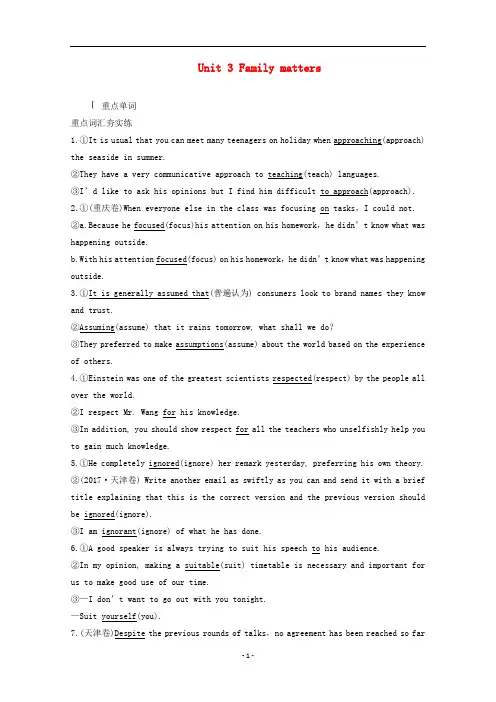
Unit 3 Family mattersⅠ重点单词重点词汇夯实练1.①It is usual that you can meet many teenagers on holiday when approaching(approach) the seaside in summer.②They have a very communicative approach to teaching(teach) languages.③I’d like to ask his opinions but I find him difficult to approach(approach).2.①(重庆卷)When everyone else in the class was focusing on tasks,I could not.②a.Because he focused(focus)his attention on his homework,he didn’t know what was happening outside.b.With his attention focused(focus) on his homework,he didn’t know what was happening outside.3.①It is generally assumed that(普遍认为) consumers look to brand names they know and trust.②Assuming(assume) that it rains tomorrow, what shall we do?③They preferred to make assumptions(assume) about the world based on the experience of others.4.①Einstein was one of the greatest scientists respected(respect) by the people all over the world.②I respect Mr. Wang for his knowledge.③In addition, you should show respect for all the teachers who unselfishly help you to gain much knowledge.5.①He completely ignored(ignore) her remark yesterday, preferring his own theory.②(2017·天津卷) Write another email as swiftly as you can and send it with a brief title explaining that this is the correct version and the previous version should be ignored(ignore).③I am ignorant(ignore) of what he has done.6.①A good speaker is always trying to suit his speech to his audience.②In my opinion, making a suitable(suit) timetable is necessary and important for us to make good use of our time.③—I don’t want to go out with you tonight.—Suit yourself(you).7.(天津卷)Despite the previous rounds of talks,no agreement has been reached so farby the two sides.8.①The project was set up with the aim of helping the disabled.②After the smart hunter found the aim in the distance, he took aim at it immediately.③His aim was to shoot(shoot) the bottles.He aimed at the bottles but at last missed his aim.Ⅱ重点短语会书写1.turn to 求助于;致力于;从事于;查阅;翻到(书的某页)2.in surprise 惊奇地,吃惊地3.be interested in 对……感兴趣4.in the end 最终5.in the lead 领先6.be proud of 对……感到骄傲,以……为荣7.take sb’s advice 采纳某人的建议8.at the same time 同时9.in trouble 处于困境中,陷入麻烦中会应用1.He was proud of himself for winning first prize.2.What he said is right so you should take his advice.3.It’s hard work but if you hang on you’ll succeed in the end.4.When she heard the news, she screamed in surprise.5.The finish line is close.He is still in the lead so he is sure to win.Ⅲ重点句型1.完全倒装句Oh look, here comes my boy.[仿写] 在公园的中央有一个很大的湖。
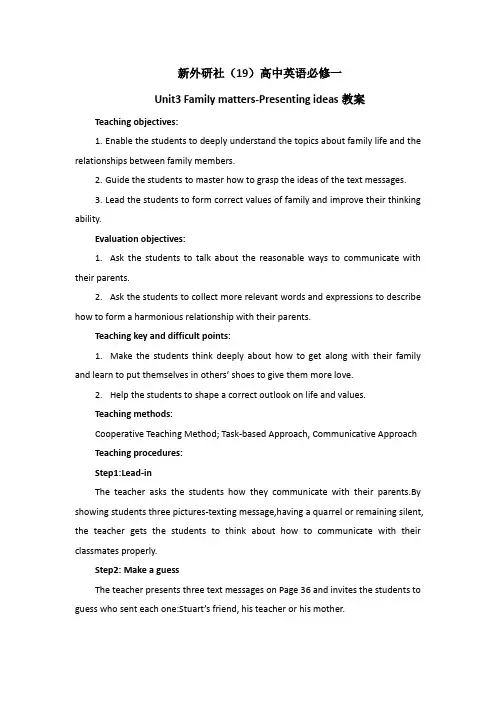
新外研社(19)高中英语必修一Unit3 Family matters-Presenting ideas教案Teaching objectives:1.Enable the students to deeply understand the topics about family life and the relationships between family members.2.Guide the students to master how to grasp the ideas of the text messages.3.Lead the students to form correct values of family and improve their thinking ability.Evaluation objectives:1.Ask the students to talk about the reasonable ways to communicate with their parents.2.Ask the students to collect more relevant words and expressions to describe how to form a harmonious relationship with their parents.Teaching key and difficult points:1.Make the students think deeply about how to get along with their family and learn to put themselves in others’ shoes to give them more love.2.Help the students to shape a correct outlook on life and values.Teaching methods:Cooperative Teaching Method; Task-based Approach, Communicative Approach Teaching procedures:Step1:Lead-inThe teacher asks the students how they communicate with their parents.By showing students three pictures-texting message,having a quarrel or remaining silent, the teacher gets the students to think about how to communicate with their classmates properly.Step2: Make a guessThe teacher presents three text messages on Page 36 and invites the students to guess who sent each one:Stuart’s friend, his teacher or his mother.Q1:Why did Stuart behave like this?______________________________________________________________Q2:If you were Stuart,what would you do?Step3:Deep thinkingThink about the saying “Home is where you are loved the most and act the worst”.______________________________________________________________Do you agree with it?Give examples to support your opinion.Suggested answers:It is your family members who love you the most and tolerate all your inappropriate behavior,while it is them who you treat with the most impolite attitude or behavior.Step4:Watch a short videoShow the students a short video about family matters.Have a group discussion about the following question and then invite some students to present their answers.What do you learn from this video?Suggested answers:Cherish the time with our parents and behave well. Parents are the ones who love us most.Step5:Share your ideasAsk the students about the following questions:1.How is the relationship between you and your parents?2.What is the ideal relationship between children and parents?Suggested answers:The answers may varyStep6:WritingThere will definitely be many stories between you and your parents in your growth.Can you write down a short story between you and your parents?The following phrases may help you.Phrases for choiceshare feelings and ideas withmake friends with sbkeep company withget along/on well with...be disappointed with sbbe satisfied/content withsome conflicts between youargue withHomework:Writing你校将要举行一次主题为“How to Communicate with Our Parents”的英语演讲比赛,请你用英语写一篇演讲稿。
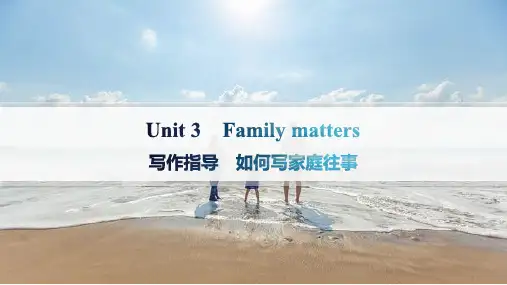
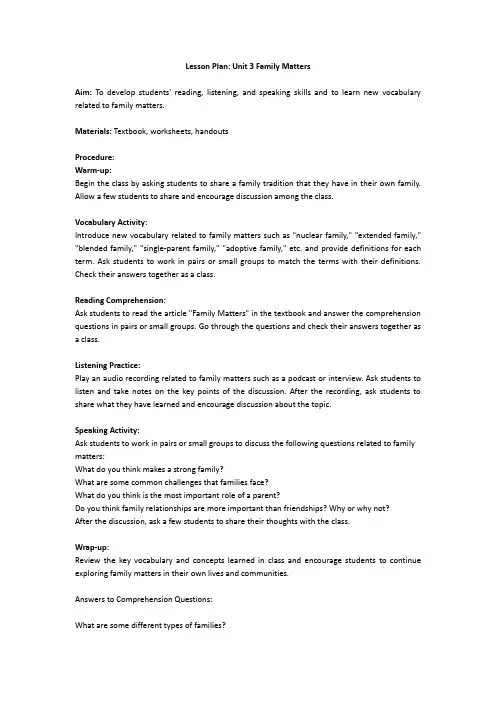
Lesson Plan: Unit 3 Family MattersAim: To develop students' reading, listening, and speaking skills and to learn new vocabulary related to family matters.Materials: Textbook, worksheets, handoutsProcedure:Warm-up:Begin the class by asking students to share a family tradition that they have in their own family. Allow a few students to share and encourage discussion among the class.Vocabulary Activity:Introduce new vocabulary related to family matters such as "nuclear family," "extended family," "blended family," "single-parent family," "adoptive family," etc. and provide definitions for each term. Ask students to work in pairs or small groups to match the terms with their definitions. Check their answers together as a class.Reading Comprehension:Ask students to read the article "Family Matters" in the textbook and answer the comprehension questions in pairs or small groups. Go through the questions and check their answers together as a class.Listening Practice:Play an audio recording related to family matters such as a podcast or interview. Ask students to listen and take notes on the key points of the discussion. After the recording, ask students to share what they have learned and encourage discussion about the topic.Speaking Activity:Ask students to work in pairs or small groups to discuss the following questions related to family matters:What do you think makes a strong family?What are some common challenges that families face?What do you think is the most important role of a parent?Do you think family relationships are more important than friendships? Why or why not?After the discussion, ask a few students to share their thoughts with the class.Wrap-up:Review the key vocabulary and concepts learned in class and encourage students to continue exploring family matters in their own lives and communities.Answers to Comprehension Questions:What are some different types of families?Nuclear family, extended family, single-parent family, blended family, adoptive family, foster family, etc.What are some common challenges that families face?Financial difficulties, communication issues, conflicts between family members, work-life balance, etc.What are some strategies for building strong family relationships?Spending quality time together, communicating openly and honestly, showing appreciation and respect for one another, supporting each other through difficult times, etc.How do family relationships change over time?Family relationships may change as members grow and develop, move away from home, get married or start their own families, face new challenges, etc.Exercises:Match the following family types with their definitions:a. nuclear familyb. extended familyc. single-parent familyd. blended familye. adoptive familyDefinitions:A family consisting of one parent and one or more children.A family consisting of a married couple and their children.A family in which one or more children are adopted.A family consisting of relatives such as grandparents, aunts, uncles, and cousins.A family in which one or both partners have children from a previous relationship.Answers:a - 2b - 4c - 1d - 5e - 3Answers:a. Nuclear family, extended family, single-parent family, blended family, adoptive family, foster family, etc.b. Financial difficulties, communication issues, conflicts between family members, work-life balance, etc.c. Spending quality time together, communicating openly and honestly, showing appreciation and respect for one another, supporting each other through difficult times, etc.d. Family relationships may change as members grow and develop, move away from home, getmarried or start their own families, face new challenges, etc.Discuss the following questions with a partner or small group:a. What do you think makes a strong family?b. What are some common challenges that families face?c. What do you think is the most important role of a parent?d. Do you think family relationships are more important than friendships? Why or why not? Answers may vary.Homework:Write a short essay on the topic "My Family." Describe your family relationships, traditions, and values. Use new vocabulary related to family matters.。


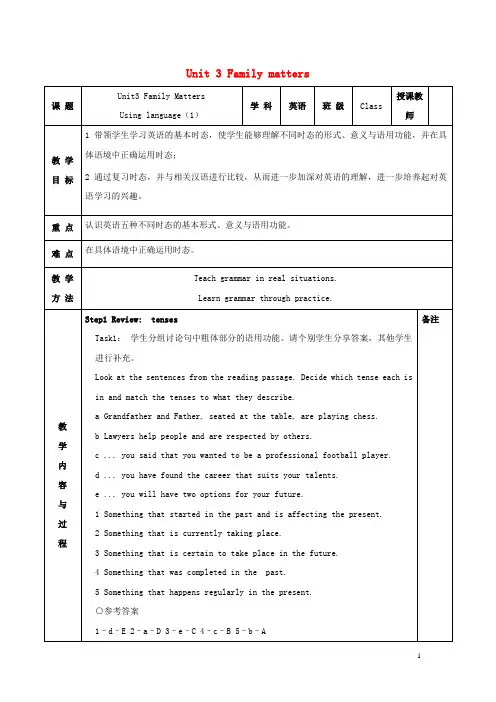
Unit 3 Family mattersTask2:请学生为句子的时态匹配相应的时间轴,并在课文中找到更多各个时态的例句。
讨论这些时态还有哪些语用功能,并举例说明。
Now match the sentences to the correct timelines and find more examples of these tenses in the reading passage.Step2 Presenting时态讲解教师结合课文内容,讲解英语中常见时态的形式、意义和语用功能。
1 一般现在时形式:主语 + am / is / are;主语 + do / does功能:用来描述 1)现在存在的特征或状态;2)经常发生的或习惯性动作;3)客观事实或普遍真理。
例句:1)The lion is a large animal of the cat family.2)They walk to school every day.3)Light travels faster than sound.○参考答案They have decided to throw a party to celebrate Grandma’s birthday. They have all chosen presents for Grandma. Dad drew up the guest list on Wednesday, and he is now making the invitations. Mum will prepare food and drinks for the party on Sunday morning.Step5 Homework以表格形式总结所学时态。
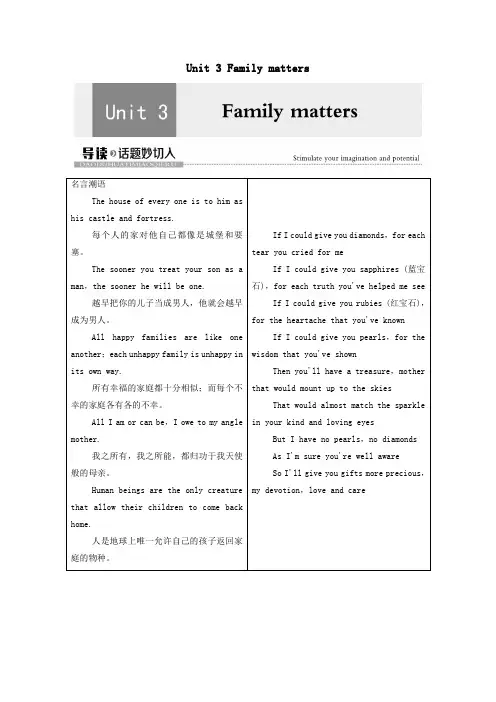
Unit 3 Family matters名言潮语The house of every one is to him ashis castle and fortress.每个人的家对他自己都像是城堡和要塞。
The sooner you treat your son as a man,the sooner he will be one.越早把你的儿子当成男人,他就会越早成为男人。
All happy families are like one another;each unhappy family is unhappy in its own way.所有幸福的家庭都十分相似;而每个不幸的家庭各有各的不幸。
All I am or can be,I owe to my angle mother.我之所有,我之所能,都归功于我天使般的母亲。
Human beings are the only creature that allow their children to come back home.人是地球上唯一允许自己的孩子返回家庭的物种。
If I could give you diamonds,for each tear you cried for meIf I could give you sapphires (蓝宝石),for each truth you've helped me see If I could give you rubies (红宝石),for the heartache that you've known If I could give you pearls,for the wisdom that you've shownThen you'll have a treasure,mother that would mount up to the skiesThat would almost match the sparkle in your kind and loving eyesBut I have no pearls,no diamondsAs I'm sure you're well awareSo I'll give you gifts more precious,my devotion,love and care美文欣赏Fatherhood (父亲的身份)can come in many different forms.Besides a natural father,a grandfather or uncle can also be considered to be the fatherhood if a child's father is absent or unable to provide the proper guidance,love or support.Whatever forms a father figure takes,he can have a positive influence on a kid.A father figure can have a positive influence on a young child if he uses a slightly different way to educate his child from the mother.As children grow older and head towards adulthood,they depend on the adults in their lives foradvice and guidance.Many teenagers and young adults depend on their father figures for examples of how men should behave.It may be easier for a strong father figure to set rules for a boy than it is for his mother—or mother figure—no matter how strong she is.This is particularly suitable for adolescent (青春期的) boys,who may struggle to follow rules set by a mother figure.Father figures can have a great effect on a young girl's selfworth.A girl whose father figure truly believes in her will more likely have the confidence to overcome challenges and meet her goals.It's believed that a girl who feels accepted and loved unconditionally by her[探索发现]1.Think of a proper title for the passage.2.Find out the author's attitude towards father figures.3.Find out the purpose for which the author writes the text.2.Positive.3.To show the importance of father figures.。
Unit 3 Family matters
freckles on her cheeks now.
Task 2 : 引导学生分类整理 Task 1 描写外貌的词汇和表达,并拓展更多相关表达,构建话题下的词汇语义网。
Underline the words and expressions used to describe appearances in Task 1 and put them into the table. Add any more you can think of.
参考答案:
Task 3 : 鼓励学生在真实的语境中运用所学语言知识,两人一组,按要求描述各自家庭成员外貌的变化,尽可能多地使用上述表格所填写的词汇和
表达。
Work in pairs and describe how your family members’ physical appearances have changed.
My mother was / had... Now she is / has got...
Step2 Before-listening
学生分组讨论这六张图片分别表现的情感态度,做好听前准备。
教师带领学生听录音,理解对话的主旨大意和对话人物的情感态度。
Listen to the conversation and choose the feelings that the speakers express.
Step3 While-listening
Task1. 根据听到的信息完成填空。
如有需要,可再次播放录音,请学生边听录音边做笔记,记录对话中用于道歉的表达方式。
Listen again and complete Alice’s journal entry.
Task2.
第一步:请学生分组讨论对话中与家人道歉的方式,提醒学生同时关注道歉时的语气。